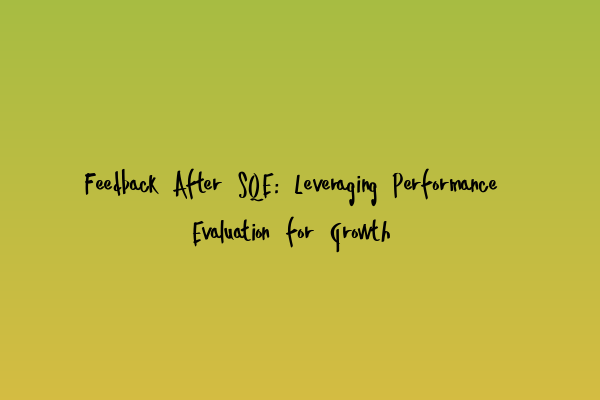Feedback After SQE: Leveraging Performance Evaluation for Growth
Introduction:
Congratulations on successfully completing the Solicitors Qualifying Examination (SQE)! As a newly qualified solicitor, you have embarked on an exciting journey in the legal profession. One vital aspect of professional growth is leveraging feedback and performance evaluations to continuously improve and develop your legal skills. In this blog post, we will explore the importance of feedback after SQE and how you can use it to propel your career forward.
The Power of Feedback:
Feedback is invaluable when it comes to professional development. It allows you to gain insights into your strengths and weaknesses, identify areas for improvement, and track your progress over time. As a solicitor, feedback after SQE is particularly crucial as it provides you with an opportunity to reflect on your performance and refine your legal abilities.
Solicitors Regulation Authority (SRA) Assessment Feedback:
As part of the SQE examination process, the SRA provides candidates with detailed feedback on their performance. This feedback includes a breakdown of your scores in each assessment, highlighting areas where you excelled and areas that may require further attention. It is important to carefully review this feedback to identify patterns, trends, and specific areas for improvement.
Leveraging Feedback for Personal Growth:
1. Reflect on your performance: Take the time to carefully analyze and reflect on the feedback provided by the SRA. Consider the comments and suggestions made, and think about how you can apply them to enhance your legal skills. This reflection process is crucial for personal growth and improvement.
2. Identify strengths and weaknesses: Assess your performance in each section of the SQE and identify your strengths and weaknesses. Understanding your strengths will allow you to capitalize on them in your future legal career. Identifying your weaknesses enables you to focus on targeted training and development to improve in those areas.
3. Create a personalized development plan: Based on the feedback received, create a tailored development plan that outlines specific actions and strategies to enhance your legal skills and address any areas of improvement. This plan could include attending relevant training courses, seeking guidance from senior colleagues, or engaging in further reading and research.
4. Seek mentorship and guidance: Feedback can be more meaningful and actionable when you discuss it with experienced colleagues or mentors. Engage with senior solicitors or legal professionals who can offer insights, guidance, and support. They can help you navigate the feedback and provide practical strategies for improvement.
5. Continuous improvement and learning: Incorporate a mindset of continuous improvement into your legal practice. Aim to regularly evaluate your progress, seek feedback from supervisors, and actively pursue further development opportunities. Embrace lifelong learning and stay updated with changes and developments in the legal industry.
Benefits of Leverage Feedback:
1. Accelerated career progression: Utilizing feedback to identify areas of improvement and actively working on them can lead to accelerated career progression. Employers value solicitors who show a commitment to self-improvement and are proactive in addressing their weaknesses.
2. Enhanced client satisfaction: Feedback not only helps you grow as a solicitor but also ensures better outcomes for your clients. By addressing your areas of improvement, you can provide a higher level of service and enhance client satisfaction.
3. Increased confidence: Utilizing feedback to refine your legal skills will boost your confidence as a solicitor. Knowing that you have actively worked on your weaknesses and improved in those areas will give you the confidence to tackle more challenging legal matters.
Conclusion:
Feedback is a powerful tool for professional development, and it becomes even more important after completing the SQE. Embrace feedback as a solicitor and leverage it to continuously improve and grow in your legal career. By reflecting on your performance, identifying strengths and weaknesses, and implementing a personalized development plan, you can propel your career forward and achieve success as a solicitor. Remember, feedback is not a one-time event but an ongoing process that drives continuous improvement and leads to long-term success.

Leave a Reply